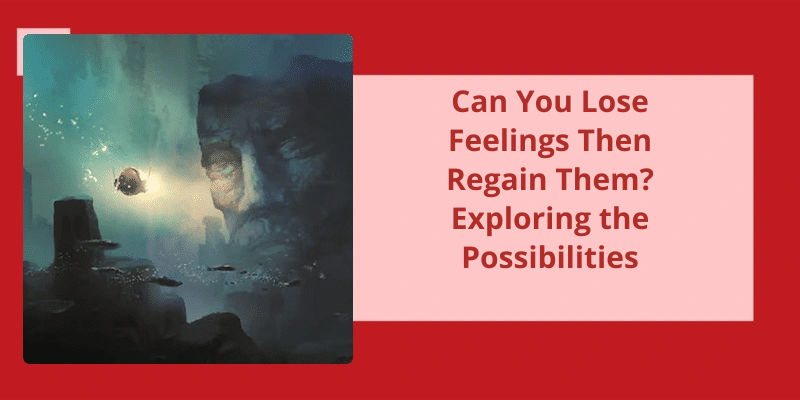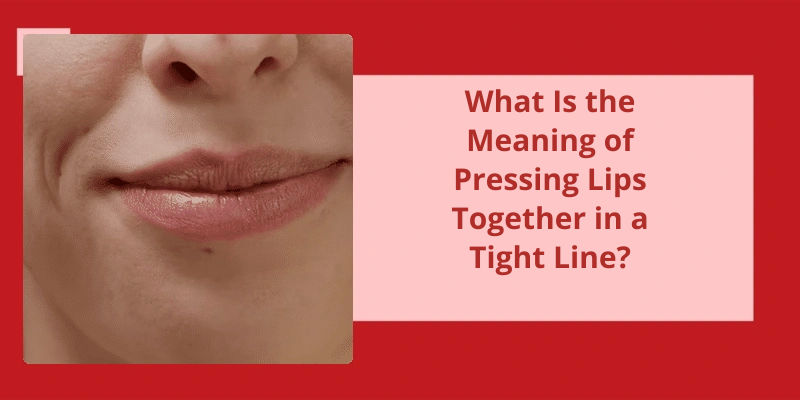When it comes to relationships, emotions can be unpredictable and at times, confusing. It's not uncommon for individuals to experience a shift in their emotions towards their partner. Perhaps, what started as infatuation and passion has now dwindled down into a sense of indifference or even dislike. The question is, can you lose these feelings and then regain them again? The answer isn’t a simple one, as it can depend on a variety of factors such as the reason why the original feelings dissipated and whether or not both individuals are willing to work towards reigniting the spark. However, it's important to remember that just because you’ve lost feelings right now, doesn't mean that you can't ever get them back. Relationships can go through many different phases, and with the right effort and communication, it's possible to rekindle the love and passion that was once there.
Can You Make Someone Regain Feelings?
Whether or not you can make someone regain their feelings ultimately depends on the individual and the circumstances surrounding the relationship. While it isn’t possible to force someone to feel a certain way, there are ways to help restore the bond between two people.
One of the most important steps in rekindling feelings is focusing on self-improvement. This means taking the time to assess who you’re as a person and making positive changes that won’t only improve your relationship with the other person, but also your own self-worth. By working on yourself, you can become more confident and comfortable with who you are, which can translate into a healthier and more fulfilling relationship.
In addition, spending quality time together is crucial in rebuilding a connection. This means finding activities that you both enjoy and making an effort to schedule regular dates or outings. It’s important to be present in the moment and truly engage with the other person, showing them that you care and value their company.
Another important factor is being thoughtful and kind. This means showing genuine interest in the other persons life and being supportive and understanding of their needs. Communication is key in any relationship, so taking the time to listen and communicate effectively can help strengthen the bond between two people.
While there are no guarantees when it comes to matters of the heart, taking these steps can help create a more positive and loving environment for both people involved. It’s important to remember that relationships take time and effort, and that there may be setbacks along the way. However, by being patient, kind, and working together, it’s possible to rekindle feelings of love and create a deeper and more fulfilling connection.
While you can’t control the other persons emotions, you can control your own actions and how you choose to respond to the situation. By focusing on self-improvement, spending quality time together, and being thoughtful and kind, you can create an environment that’s conducive to rekindling feelings and building a stronger relationship.
However, losing feelings for someone can also be a confusing and painful experience, especially if you still care about the person and don’t want to hurt them. If you’re going through this experience, it’s important to understand what’s happening, acknowledge your emotions, and take care of yourself.
What Does It Mean to Lose Feelings for Someone?
When you lose feelings for someone, it can be a confusing, painful and sometimes guilt-ridden experience. You may question why you cant seem to feel the same way about your partner as you once did and question if it’s your fault. However, it’s important to remember that falling out of love is a normal part of any relationship, whether it be romantic or not.
Losing feelings for someone can be a natural response to changes in the relationship dynamic, or it can be a result of personal growth and self-discovery. Sometimes people grow apart and start to see the world in different ways, making it challenging to maintain a strong connection. When the relationship starts to lose it’s spark, you may find yourself becoming uninterested in their desires, thoughts and feelings, and the relationship may start to feel stagnant with little growth.
It’s essential to communicate with your partner and let them know how youre feeling. Avoiding the conversation may prolong the pain and confusion, leading to even more hurt in the long run. Be honest with yourself and your partner about your thoughts and feelings, and try to explain your perspective without placing blame.
It’s important to communicate openly and honestly and take the time to re-evaluate the relationship before making any rash decisions. Remember, change is normal, and it’s okay to fall out of love with someone you once cared intensely for. As long as you approach the situation with empathy, understanding, and open-mindedness, theres always hope to regain the connection lost.
How to Cope With Losing Feelings for Someone
There’s no one-size-fits-all solution for coping with losing feelings for someone, but it can be helpful to engage in self-reflection, communicate honestly with your partner or a trusted friend, and prioritize self-care. It’s important to remember that it’s okay to have changing feelings and to prioritize your own emotional wellbeing.
However, if someone is truly invested in a long-term relationship with you, it may take much longer for those feelings to fade, or they may never truly go away. Let’s explore the various factors that contribute to how long it takes for someone to lose feelings for you.
How Long Does It Take for Someone to Lose Feelings for You?
However, if your relationship is based on genuine emotions and deep connection, it may take much longer for them to lose feelings for you. It also depends on the reason for losing feelings – if it’s due to a specific incident or event, the feelings may disappear quickly, whereas if it’s due to a gradual realization that you aren’t compatible, it may take longer.
It’s important to note that every individual is different, and there’s no set timeline for losing feelings. Some people may lose feelings quickly, while others may hold on to them for years. It also depends on the nature of the relationship – for example, a long-term relationship may take longer to lose feelings than a short-term fling.
Ultimately, the best way to prevent someone from losing feelings for you is to be genuine, communicative, and invested in the relationship. If both parties are on the same page and committed to making it work, there’s a higher likelihood of feelings remaining strong. However, if one person isn’t as invested, it may lead to a quicker loss of feelings.
It’s important to be aware of these factors and work towards maintaining a healthy and committed relationship. While there’s no set timeline for losing feelings, being aware of these factors can help prevent premature loss of emotions.
The Signs to Look Out for When Someone Starts Losing Feelings for You
When someone starts losing feelings for you, they may become distant or withdraw from spending time with you. They may stop showing affection or expressing their love for you. Communication may become less frequent or weaker, and they may not respond as often as before. If you notice these changes, it’s essential to have an honest conversation to understand how your partner feels.
Source: 6 Clear Signs Your Partner Is Losing Interest And How To Fix It
Maintaining a healthy relationship requires effort and consistency from both partners. But what happens when one partner begins to lose interest or emotional connection? There are a few signs that may indicate that one is losing feelings in a relationship, such as a lack of communication, changes in attitude, making oneself less available, or ignoring one’s partner. Another significant sign is the absence of arguments, which may seem positive, but could highlight deeper underlying issues. Let’s explore these signs in more detail.
What Are the Signs of Losing Feelings?
Losing feelings in a relationship is never a pleasant experience. It can be difficult and disheartening to realize that the connection you once had with your partner is fading away. While some signs of losing feelings may be more obvious than others, it’s essential to pay attention to all of them in order to determine whether your relationship is in trouble.
If you feel less enthusiastic or invested in the relationship, it might be a sign that you’re no longer interested in pursuing this connection. This can be a gradual process, and it’s important to recognize that even small changes in attitude can have a significant impact on the partnership.
Making yourself less available is another red flag. If you’re no longer willing to commit time and effort to your relationship, it’s possible that you’ve lost feelings for your partner. This can manifest in many different ways, from canceling plans to avoiding communication altogether.
Ignoring your partner is perhaps the most blatant sign of losing feelings in a relationship. If you find yourself actively avoiding your partner or shutting them out of your life, it’s time to reevaluate your emotions and motivations.
Finally, a lack of arguing can also be a sign that feelings have faded away. While arguments are never pleasant, they can be a sign that two people are invested in the relationship and are willing to work through problems. If you find that you’re no longer willing to argue or confront issues with your partner, it might be a sign that you’ve given up on the relationship altogether.
The Impact of Technology on Relationships and How It Can Contribute to the Loss of Feelings
Technology can have negative impacts on relationships, often leading to feelings of isolation or disconnection. This can be due to over-reliance on communication through devices and social media rather than in-person interactions, which can lead to a lack of emotional intimacy and misunderstandings. Additionally, the constant distraction of technology can interfere with quality time spent together and a deeper understanding of each other’s feelings.
Understanding the various types of emotional numbness is important, as it can help identify underlying mental health issues that may require professional intervention. In this article, we will explore the causes, symptoms, and treatment options for flat affect and anhedonia, and provide tips on how to cope with these conditions.
What Happens When You Lose Your Feelings?
Losing the ability to experience emotions can be a scary and disorienting experience. Emotions are an essential part of being human and play a significant role in decision-making, relating to others, and overall quality of life. When we lose our feelings, our ability to connect with others, to experience joy and pleasure, and to engage with our surroundings becomes severely restricted. Without emotions, life can feel very flat and devoid of meaning.
For people with mental health conditions, such as depression or anxiety, losing the ability to experience positive emotions is a common symptom that can make recovery more challenging. Anhedonia can appear as a result of sustained emotional pain or trauma, and it can cripple individuals ability to experience pleasure, joy, or any positive emotions.
Losing feelings can also impact relationships significantly. Without the ability to feel empathy or compassion, it can be challenging to relate to others emotionally, leading to strained relationships. People who’ve lost their feelings may struggle to express themselves appropriately, sending mixed messages or relying purely on logic (if that) to communicate. When we connect with others, we often do so through emotional mirroring, sharing others emotions. When we cant do this, our relationships can become difficult, particularly if the other person is unable to empathize with you.
However, it’s possible to recover from anhedonia or flat affect. Treatment is available for people with mental health conditions that impact emotion regulation. Through therapy and other evidence-based treatment options like medication, individuals can learn how to reconnect with their feelings over time. Coping mechanisms, such as mindfulness, exercise, and self-care, can also help individuals regulate their emotions and reduce symptoms of anhedonia or flat affect.
Ultimately, losing the ability to feel or express emotions can have significant consequences on our quality of life. Seeking treatment and support from mental health professionals and loved ones can help individuals recover from these symptoms and regain their emotional balance to live happier, more fulfilling lives.
Conclusion
It's important to evaluate why you may have lost those feelings and work through any underlying issues with your partner. Communication is key in any relationship, and being honest about your current emotions can start the process of rebuilding those lost feelings. Ultimately, only you can decide if continuing the relationship is worth it for you, but it's important to remember that with effort and open communication, it’s possible to reignite the connection you once had. The journey may not be easy, but it can be rewarding if both parties are willing to commit to making it work.






